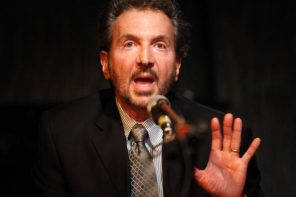All eyes were on San Francisco this week as the California Supreme Court handled the legal challenge to Prop 8 like a worker at Oak Ridge might approach a fresh batch of plutonium—that is, very carefully and with a long-handled set of tongs.
“Is it for this court to limit the people’s power to amend the constitution?” asked Chief Justice Ronald George, who last May wrote the majority opinion that struck down California’s earlier ban on same-sex marriage.
Justice Joyce Kennard, who joined Chief Justice George in the 4-3 opinion, seemed to echo the arguments of Kenneth Starr, the former nemesis of Bill Clinton and dean of the conservative law school at Pepperdine University who’s serving as counsel for Protect Marriage, the organization that sponsored Prop 8.
Voters “took away the label of marriage,” Justice Kennard said, “but…left intact most of what this court declared,” including constitutional protections for gays and lesbians unmatched by any other state in the country.
While it seems unlikely the court will upend Prop 8—at issue is whether the ballot measure merely amended the state’s constitution or actually revised it—there were also strong indications that the 18,000 same-sex marriages registered in the six months between the court’s ruling and Election Day would remain legally valid.
“When the highest court of the state declares that same-sex couples have the right to marry…how can one deny the validity of those marriages?” asked Justice Marvin Baxter, who was one of the three dissenting voices in last May’s ruling.
A cohort of legally married queerfolk the size of Poughkeepsie or Fairbanks is a pretty large wedge in a door that Starr and his fellow travelers would like to close for good. In any case, the justices have 90 days from yesterday’s hearing to issue a ruling. And talk of a new ballot initiative to un-amend (or re-revise?) California’s constitution is already in the air.
Meanwhile, in Washington, DC, Ellen Tauscher—the representative from California’s 10th congressional district, a suburban patchwork of cities to the northeast of Berkeley—set in motion a legislative debate that will nudge the Obama administration to make good on one of the new president’s key campaign promises to his LGBT constituency.
Tauscher introduced a federal bill on Monday that would repeal “Don’t Ask Don’t Tell,” the Clinton administration’s slipshod compromise on its similar vow to repeal the ban on gays in the military.
Tauscher’s announcement came at the Center for American Progress, a Democratic think-tank, where she was joined by Nathaniel Frank, author of Unfriendly Fire: How the Gay Ban Undermines the Military and Weakens America. In an interview in this month’s issue of The Advocate, Frank recounts the willful ignorance that prevailed in the military culture during the Clinton-era effort to lift the ban:
Even as they ignored a 500-page RAND Corp. report commissioned by the Pentagon showing that open service wouldn’t affect military readiness, generals watched a video circulated by a Christian producer that graphically described gay sexual practices.
What a difference a new millennium makes. A decade and a half ago, only 40 percent of the voting-age population was in favor of allowing gays and lesbians to serve openly. Now, while most polls show that fewer than half of the adults in the U.S. support same-sex marriage, between two-thirds and three-quarters say that gay and lesbian military personnel should be able to serve openly. That broad popular support for lifting the ban, coupled with the backing of military eminences like Colin Powell and Gen. John Shalikashvili, suggests that Tauscher’s legislation has a decent chance of passage.
And in Boston on Tuesday, a gay and lesbian advocacy group filed a lawsuit in federal court challenging one of the key provisions of the Defense of Marriage Act, another of Bill Clinton’s sops to the right wing. The plaintiffs argue that, because same-sex marriage is legal in Massachusetts, the “one man and one woman” language in DOMA violates the Constitution’s equal protection clause by treating gay and lesbian couples who are legally married under state law differently than straight married couples.
Like the repeal of “Don’t Ask Don’t Tell,” scrapping DOMA was another of Barack Obama’s campaign promises. But as the Massachusetts lawsuit wends its way through the courts, there’s a good chance that the constitutionality of gay marriage bans in other states will also be called into question. That could put Obama—who supports legal parity between straight and same-sex couples but stops short of supporting gay marriage—in yet another tight spot. Will our first African-American president stick to his “separate but equal” position on gay marriage? Stay tuned…



